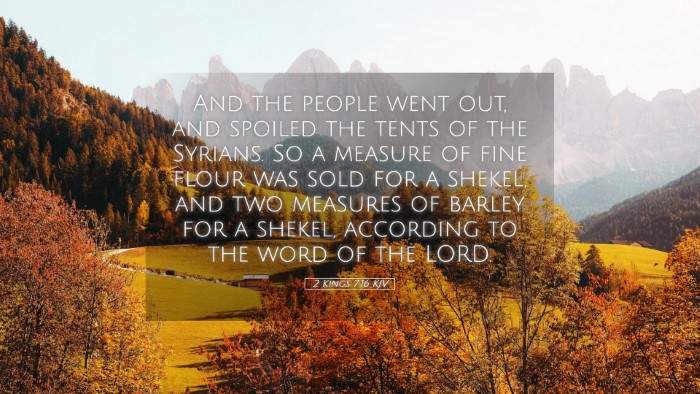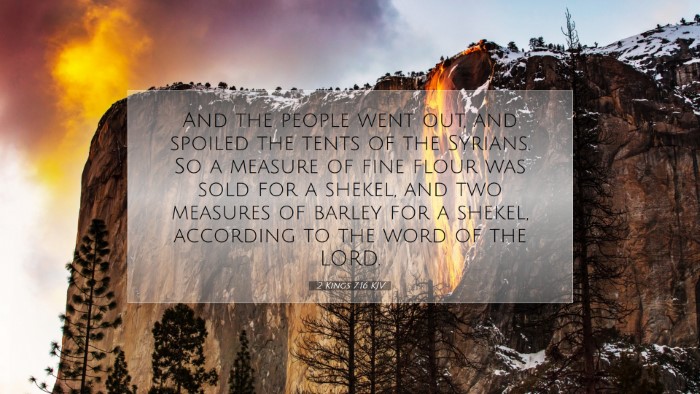Old Testament
Genesis Exodus Leviticus Numbers Deuteronomy Joshua Judges Ruth 1 Samuel 2 Samuel 1 Kings 2 Kings 1 Chronicles 2 Chronicles Ezra Nehemiah Esther Job Psalms Proverbs Ecclesiastes Song of Solomon Isaiah Jeremiah Lamentations Ezekiel Daniel Hosea Joel Amos Obadiah Jonah Micah Nahum Habakkuk Zephaniah Haggai Zechariah Malachi2 Kings 7:16
2 Kings 7:16 KJV
And the people went out, and spoiled the tents of the Syrians. So a measure of fine flour was sold for a shekel, and two measures of barley for a shekel, according to the word of the LORD.
2 Kings 7:16 Bible Commentary
Commentary on 2 Kings 7:16
Verse Context: 2 Kings 7:16 states, "Then the people went out and plundered the tents of the Syrians. So a seah of fine flour was sold for a shekel, and two seahs of barley for a shekel, according to the word of the LORD." This verse encapsulates the fulfillment of God's promise amidst dire circumstances, showcasing the themes of divine provision and deliverance.
Introduction
This verse marks a critical moment in the narrative of 2 Kings, occurring right after the miraculous provision of food that God provided to the besieged people of Samaria through the lepers who discovered the Syrians' camp abandoned. Here, we find rich theological implications concerning faith, divine intervention, and the transformation from famine to abundance.
Theological Insights
-
Divine Provision:
As Matthew Henry notes, the swift change from famine to abundance serves as a reminder of God's omnipotence. Even in the bleakest times, God can intervene and greatly alter one’s circumstances.
-
Fulfillment of Prophecy:
Albert Barnes emphasizes that the fulfillment of the prophet Elisha’s words demonstrates the reliability of God's promises. Despite prevailing doubt and skepticism, God honors His Word. A mere day after Elisha proclaimed abundant food would be available, the realities of famine were turned on their head.
-
Human Agency in God's Plan:
Adam Clarke highlights that the lepers play a pivotal role in this turnaround. Their decision to visit the Syrian camp not only showcases their bravery but also emphasizes the idea that God can use those whom society has marginalized to effect His purposes. The lepers' actions lead to the salvation of the entire city, reminding believers that oftentimes, the most unexpected vessels bring about divine blessings.
Cultural and Historical Context
The historical backdrop of 2 Kings 7 is essential for a nuanced understanding. The siege by the Syrians had resulted in extreme famine, forcing the inhabitants of Samaria to resort to desperate measures, including cannibalism. This context serves to heighten the miraculous nature of the events that unfold.
The mention of a "seah of fine flour" and "two seahs of barley" reflects the state of economic despair prior to God's intervention. Barnes interprets this as providing a stark contrast to the current market conditions and shows God’s desire to restore both physical and socio-economic stability.
Exegesis of Key Terms
-
Plundered:
The term "plunder" denotes a forceful seizure of goods. The people’s actions after God’s provision indicate the blend of divine initiative and human response. They acted on the revelation and promise of God, as noted by Clarke, turning their fear into an act of faith.
-
Fine Flour and Barley:
Matthew Henry comments on the symbolic significance of fine flour, often associated with offerings in the Temple, showing that what once represented scarcity is redeemed to symbolize abundance and grace. Barley, being a staple grain, signifies sustenance and God's provision for everyday needs.
Applications for Contemporary Readers
This passage raises critical considerations for pastors, theologians, and students alike:
-
Faith in God’s Promises:
Believers are encouraged to hold fast to the promises of God even when circumstances appear impossible. The rapid change from despair to hope illustrates that God can suddenly act on behalf of His people.
-
Instrumental Nature of the Marginalized:
The narrative demonstrates God’s willingness to use the unexpected to fulfill His purposes. Pastors should be attentive to those in their communities who might seem insignificant or marginalized.
-
Community Response to Divine Action:
The collective action of the people of Samaria following the discovery of food signifies a community responding in faith to God’s provision. This could challenge modern congregations to seek unity and action in light of God’s blessings and grace.
Conclusion
2 Kings 7:16 presents powerful themes of hope, transformation, and divine intervention. The narrative juxtaposes a moment of desperation against God’s abundant provision, reaffirming that no situation is too dire for God to change. For pastors and theologians, this passage serves as a reminder of the necessity of faith and the importance of collective action in response to God’s word.


